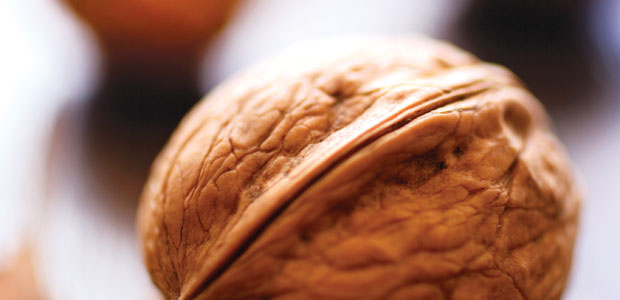Advertisement
Superfood in a Nutshell
Crack some for health

What nuts lack in size they more than make up for in nutrition.
As one of the best plant sources of protein, nuts contain an impressive mix of vitamins, minerals, and fibre, not to mention monounsaturated fats, essential omega-3 fatty acids, and phytosterol nutrients that raise their disease-fighting potential.
A growing number of clinical studies are identifying certain beneficial components in nuts, and population studies indicate that people who regularly consume nuts have a reduced risk of cardiovascular disease and type 2 diabetes.
The Power of Nuts
Nuts are a true superfood with food synergy. In his book Superfoods Rx–Fourteen Foods That Will Change Your Life (William Morrow, 2003), Dr. Steven Pratt suggests that food synergy refers to the interaction of two or more nutrients and other healthful substances in foods that work together to achieve an effect that each is individually unable to match.
He uses nuts as an example; the power of nuts to prevent cardiovascular diseases is far greater than one would assume by looking at any single nutrient they contain. So while individual nuts may contain higher amounts of specific beneficial nutrients, the key to deriving the most health benefits from nuts is simply to eat a variety.
Soaking or Roasting
There are many ways to eat nuts. Some people like to soak them, especially almonds, for up to 12 hours before eating, because they feel the soaking breaks down enzyme inhibitors present in the skin that would otherwise impair digestion. Some like them raw, while others prefer their nuts roasted.
One thing’s for sure: the commercial roasting process is often a form of deep-frying in unhealthy oils. This should be avoided. Even dry-roasted nuts may be cooked at high temperatures that damage their natural oils. The healthiest way to roast nuts is in a single layer on a cookie sheet in a 160 to 170 F (70 to 75 C) oven for 15 to 20 minutes.
Whatever your choice–go nuts–they’re good for you!
Protecting Your Nuts
Nuts are best purchased and stored in their shells–nature’s protection against the oxidizing effects of light and air.
Cashews are the exception. They are always sold shelled because the interior of the shell contains a caustic resin known as cashew balm that must be removed before they are fit to eat.
Nuts in the Shell
Choose shells that are:
- Not shrivelled
- Free of splits, stains, mildew, or insect damage
- Heavy for their size
- That don’t rattle when shaken (suggesting a dried out nut inside)
Shelled Nuts
- Nuts stored in hermetically sealed containers will last longer than those stored in bulk bins; they are less exposed to heat, air, and humidity.
- When purchasing nuts from bulk bins, ensure the store has a good turnover of inventory and that the bins are sealed well.
- Shelled nuts should smell sweet and nutty; if the odour is sharp or bitter, they may be rancid.
Storage
- At home, store nuts in a tightly sealed container in a cool, dry place away from exposure to sunlight.
- Ideally, keep nuts in glass containers in the refrigerator.
- Shelled nuts will last about six months in the refrigerator, up to one year in the freezer.
Nuts About Nutrition
There’s a wealth of health benefits in these tiny packages. Check the list below and crack a few for some exceptional nutrition.
| Nutrient | Benefit | Best nut sources |
| Potassium | Healthy blood pressure | Almonds and peanuts |
| Folate | Reduces homocysteine levels associated with heart disease | Peanuts |
| Polyunsaturated fats | Healthy fats that lower LDL cholesterol | Walnuts (specifically omega-3 fatty acids) and pecans |
| Vitamin E | Antioxidant that reduces free radical damage | Almonds and hazelnuts |
| Selenium | Immunity-enhancing mineral | Brazil nuts |
| Magnesium | Bone and blood vessel health | Cashews |
| Zinc | Prostate and immune health | Hazelnuts and cashews |




